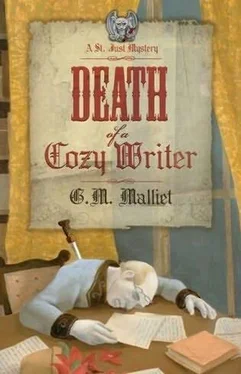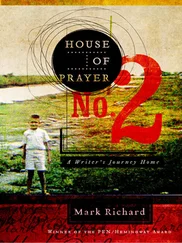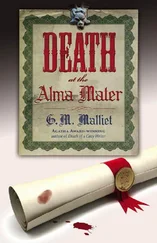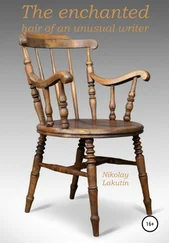“I imagine he came here to search for his roots. With a name like Spencer he’s bound to climb up several wrong branches of the family tree. Still, Americans do seem as delighted to think their forebears were yeoman as they are to learn they were ladies and lords of the realm.”
“He was sod-all use about the manuscript.”
“Do you think so, Sergeant? I’m not sure I agree. But I can think of two explanations: Either he knows everything about the rest of the tale and is being coy about it for some reason, or else he knows nothing at all, as he says.
“Let’s see if our lads have even had a chance to look at that shed he mentions.”
***
Tracking down Mrs. Butter had proved to be far easier than Albert had imagined, for, much to his surprise, she was not ex-directory. Albert had remembered her as a private person, but perhaps she had turned into one of those lonely elderly ladies who enjoyed the intrusion of salesmen’s telephone calls on her dinner hour.
Getting out of the house proved a far more difficult matter than locating Sir Adrian’s former secretary, for the press had dug in without the gates and could occasionally be spotted lurking in the trees or patrolling the perimeters of the house in the hope of a photo opportunity-or, better yet, another murder to report.
While St. Just had warned the family not to leave, Albert told himself what he meant was that they should not depart permanently for the Costa del Sol. But they were effectively held hostage anyway unless they were willing to run this gauntlet of reporters and photographers. Albert, usually ravenous for publicity, decided that there were, after all, occasions when bad publicity was worse than none, and that this was one of those occasions.
He kicked himself for not having brought his full stage makeup kit with him, but in the end, he felt that a minimum of disguise was safe enough: a hat pulled low over his forehead and a scarf muffling his nose. He would have borrowed Watter’s wellies, to aim for a more rustic effect, but Watters had been complaining yesterday that the police had now “run off” with all of them. Thus minimally shielded from photographers, Albert headed toward the opening in the fieldstone wall at the back of the estate, an area so overgrown, so untouched by Watters since time immemorial, that Albert felt certain no city-bred journalist would venture there.
Sergeant Porter, meanwhile, spotting him through field glasses from the roof, radioed Sergeant Fear to ask if he wanted him followed, or stopped.
A half-hour’s walk brought Albert to the village in time to catch the chicken-stop train that would take him into Cambridge. From there he traveled to Ipswich and, after a slight delay, to Felixstowe, on the way passing endless farmland and little else. At another time of year, fields of corn would have enlivened the gray scenery. Albert peered somberly through the rain-spattered, fogged-up window of the train as it approached the resort town, perched at the tip of a flat peninsula standing fast against the North Sea. In summer the beach and pier served as a backdrop for the full catalog of the human form on parade, wearing all the possible hues of sunburn. During winter, no one seemed to have business at the seaside-indeed, Albert began to regret that his costume had not included another layer of wool, for the wind at water’s edge once he arrived at Felixstowe was fierce, stinging as it spat saltwater in his eyes.
He took a taxi to the other end of the bay, to the little fishing town of Felixstowe Ferry, a village consisting of little more than a cluster of cottages, a pub, a dollsized church, and a boatyard resting on low-lying land at the mouth of the River Deben.
He had taken the precaution of phoning ahead from the station at Cambridge. Mrs. Butter greeted him warmly at the door.
“It’s lovely to see you, my dear,” she said, taking his coat. “I don’t get many visitors. Of course, that was the point in moving way out here.”
Like Jim Tanner’s cat at the Thorn and Crown, she seemed untouched by time. The room she led him into just off the hallway was of the kind where stacks of books and furnishings upholstered in a riot of chintz patterns seemed to proliferate of their own accord. Green and red dominated the color scheme-in the plaid at the windows and in assorted garden prints on chairs and sofa. It was, apparently, Christmas every day at Mrs. Butter’s house.
The ceiling was painted a deep goldenrod that reflected back an Aubusson carpet on the flagstone floor. The bright colors in such a small room should have been unsettling but, once the eye adjusted, were oddly restful, with flames from the Tudor-style fireplace casting flickering light and shadow against the ceiling. Two brass sconces, one on either side of the hearth, provided further soft illumination.
A lovely blue-point Siamese dozed atop a copy of The Rise and Fall of the British Empire . As Albert walked in, it stirred, opened one eye, stretched one paw in what looked like a friendly wave, and went back to sleep.
Presumably there had once been a Mr. Butter, but he was nowhere in evidence.
She bustled about a bit, offering tea and an assortment of little cakes and sandwiches that Albert was certain had been purchased specially for his visit. Mrs. Butter, despite the implications of her name, was neither large nor particularly plump. Age had followed its tradition of redistributing her weight a bit more around her waist, making her even more sparrow-like in appearance- rounded and brownish gray with black-button eyes that missed nothing. He imagined she kept herself fit with brisk, healthful walks at water’s edge.
Albert hoped she could afford the lavish little spread for tea, and was torn between consuming everything offered to show his appreciation for her effort and eating sparingly so there would be something left for her the next day. In the end, ravenous hunger won out-he had had nothing to eat all day but the dry crust and cheese sandwich wrapped in plastic on offer from British Rail.
After awhile she finished fussing. Sitting back and fixing him with those shiny dark eyes, she asked:
“So, what was the old devil up to, then?”
Taking the signal that they were now getting down to business, Albert looked around for a place to set aside his plate.
“Oh, put it on top of Mathew Arnold. Do him good to be used as a tray,” she said. “Tedious man.”
Albert placed the remains of his fish paste sandwich on top of the Collected Works to his left and delicately brushed his fingertips.
“As I mentioned when I rang you,” he said, “I’ve what appears to be a partial manuscript written by my father. It was something he was working on when he… died.”
“Yes, of course, I’ve seen the newspaper accounts. Even allowing for the usual sensationalism, it does seem to me quite a… well, quite a sensational occurrence. Terribly sordid. And extraordinarily strange. I suppose one can’t blame the press for taking a quite unhealthy interest. To be killed by an axe …”
“Knife, actually.”
The newspapers had been particularly excited by the choice of weapons used in the murders, which had been the occasion for a sidebar on medieval armaments. Malenfant not having been forthcoming with precise details, the papers had decided Ruthven and Sir Adrian had both met death by battleaxe.
“But, yes,” continued Albert. “I couldn’t agree more, really. Only natural on their part-it’s like putting a sizzling steak in front of a cage full of starving tigers. But the problem it creates for the family-”
“Oh, yes, I quite see that. It puts all of you in a horrid position, doesn’t it? Not just you, but the others staying at the house. Simply horrid.”
Читать дальше







![Изабель Гиллис - Cozy. Искусство всегда и везде чувствовать себя уютно [litres]](/books/406910/izabel-gillis-cozy-iskusstvo-vsegda-i-vezde-chuvs-thumb.webp)




